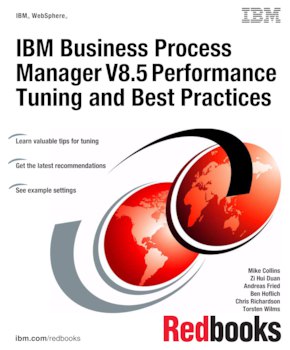About cookies on this site Our websites require some cookies to function properly (required). In addition, other cookies may be used with your consent to analyze site usage, improve the user experience and for advertising. For more information, please review your options. By visiting our website, you agree to our processing of information as described in IBM’sprivacy statement. To provide a smooth navigation, your cookie preferences will be shared across the IBM web domains listed here.

Published on 24 February 2015
Read in Google Books Order hardcopy
Share this page:
ISBN-10: 0738440418
ISBN-13: 9780738440415
IBM Form #: SG24-8216-00
Authors: Mike Collins, Zi Hui Duan, Andreas Fried, Ben Hoflich, Chris Richardson and Torsten Wilms
Abstract
This IBM® Redbooks® publication provides performance tuning tips and best practices for IBM Business Process Manager (IBM BPM) V8.5.5 (all editions) and IBM Business Monitor V8.5.5. These products represent an integrated development and runtime environment based on a key set of service-oriented architecture (SOA) and business process management (BPM) technologies. Such technologies include Service Component Architecture (SCA), Service Data Object (SDO), Business Process Execution Language (BPEL) for web services, and Business Processing Modeling Notation (BPMN).
Both IBM Business Process Manager and Business Monitor build on the core capabilities of the IBM WebSphere® Application Server infrastructure. As a result, Business Process Manager solutions benefit from tuning, configuration, and best practices information for WebSphere Application Server and the corresponding platform Java virtual machines (JVMs).
This book targets a wide variety of groups, both within IBM (development, services, technical sales, and others) and customers. For customers who are either considering or are in the early stages of implementing a solution incorporating Business Process Manager and Business Monitor, this document proves a useful reference. The book is useful both in terms of best practices during application development and deployment and as a reference for setup, tuning, and configuration information.
This book talks about many issues that can influence performance of each product and can serve as a guide for making rational first choices in terms of configuration and performance settings. Similarly, customers who already implemented a solution with these products can use the information presented here to gain insight into how their overall integrated solution performance can be improved.
Table of Contents
Chapter 1. Overview
Chapter 2. Architecture best practices
Chapter 3. Development best practices
Chapter 4. Performance tuning and configuration
Chapter 5. Database configuration, tuning, and best practices
Chapter 6. Migration considerations
Chapter 7. IT monitoring and tuning for performance testing and managing a production environment
Chapter 8. Initial configuration settings